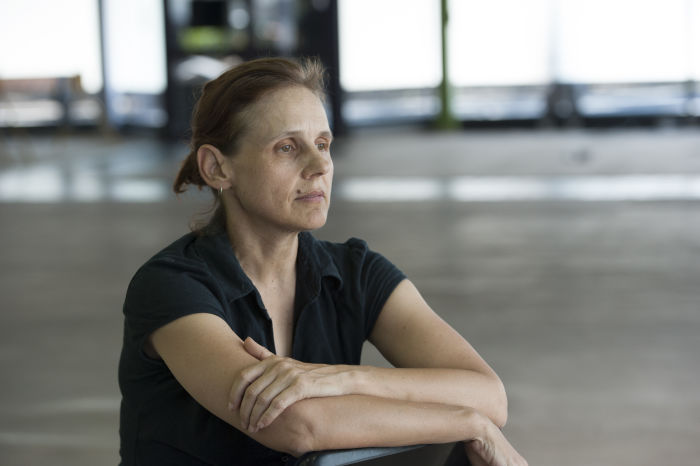In 2014 van Hout became the first Indigenous artist to be awarded the prestigious $30,000 NSW Dance Fellowship for established and mid-career dancers. At the moment, van Hout is directing Jane Harrison’s totemic play Stolen, the second feature in the inaugural program of the National Theatre of Parramatta (NTofP). So how does she feel about making the transition from dancer and choreographer to the stage and text? “Daunting,” she says. But it is hard to believe that this dynamic Wiradjuri woman would find much “daunting”. Challenged and taxed she may be, but not discouraged.
In directing a play, van Hout says, she is returning to her first love. Originally a 17-year-old van Hout was set to train as an actor and had learned her monologues for an audition with NIDA. At the time she was still at high school but also a part-time squatter at the Gunnery, an infamous hang-out in Woolloomooloo. A fellow-squatter suggested she use her monologues to audition for the National Aboriginal and Islander Developmental Skills Association (now NAISDA Dance College) and reconnect with her own culture. It was a turning point. After NAISDA she trained in modern and post-modern dance at the Martha Graham School in New York but responding to the pull of her cultural connections she returned to Sydney in 1996 and joined Bangarra,
When van Hout became an independent dancer, choreographer and performance maker, she drew on a large body of knowledge and practice. Her works, while fusing traditional movement with contemporary techniques, both reflect the interdisciplinary nature of Australian Indigenous culture and address important political issues. Briwyant (2011) explores the possibility of an urban Dreaming through a blend of live narration and inventive dance movements and Long Grass presents the contentious theme of displacement among Indigenous fringe dwellers, assigning prominence to voice-over and text.
It seems a natural progression then for the dynamic van Hout to take up the challenge of directing Stolen. First performed at the Malthouse in 1998 the playwright, Jane Harrison, brought the tragic history of children forcibly removed from their homes to public attention. The play is frequently performed so perhaps what is most challenging (but not daunting) for van Hout is the expectation that she will be bringing “a fresh take” to it. She feels the responsibility of being, as she puts it, a “portal” for Harrison’s intention and while she is not prepared to say exactly how she will leave her own imprint on the production, she does say she has noticed “a lot of scope for movement” in the script.
Candidly, van Hout admits that she is used to being sole direction. Actors, she has discovered, are different from dancers, and tend to have their own ideas about interpreting the script. At first surprised that her cast did not follow her directions immediately, she came to appreciate the value of working as a team. In addition, her performances are created through a process of development and amendment but a script is given and must be approached differently. She now sees the collaborative understanding of director, cast and production crew as the means of refining the outcome.
Van Hout is conscious also of the importance of being part of NTofP’s mission to become the voice of Australian theatre. Stolen, although well-trodden ground, is an excellent choice in several ways bringing themes that are of relevance to the rapidly expanding multicultural city of Parramatta, and to our young people who live in troubling times. Based upon the dislocation of its five Aboriginal characters, the play highlights the loss of identity, of family and of culture and is a powerful condemnation of the callous arrogance of established authority. The NTofP is a bold move and Vicki van Hout an appropriately bold choice.
Directing is hard work and long hours, van Hout says. When she returns home each evening the supermarket is closed and she resorts to the local milk bar. The proprietor commiserates with her as she buys chocolate, tinned mushrooms and pineapple yet again. “You work too hard,” he says. She does, and van Hout is fully booked to continue the process of Vickification into the future.





